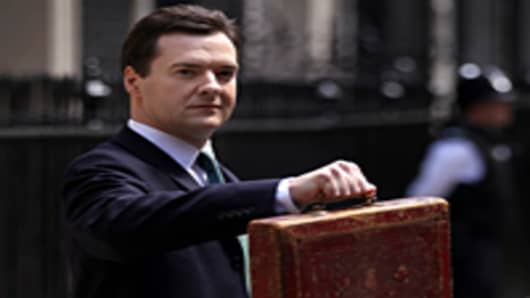UK businesses and Conservative politicians have been lobbying for an end to the 50 percent tax rate on income above 150,000 pounds ($235,500) a year since it was brought in two years ago.
They may be about to get their wish, as UK Chancellor of the Exchequer George Osborne is preparing to remove the tax in next Wednesday’s Budget, according to a report in the UK newspaper The Guardian.
Critics in the business community have called the tax, which came along with criticism of the bonus culture, “unfair,” “politically motivated” and said it “puts populist politics before sound economics.” The Chancellor commissioned a report into the benefits to the economy of the tax rate—which has not yet been published.
A Treasury spokesman declined to comment on the report.
"It is widely accepted that it actually brings in little revenue and maybe acts as a deterrent in attracting—or keeping—top talent to the UK; but scrapping it would be a high profile move and politically contentious given the ongoing message that the government is putting across that we are all having to make our fair share of sacrifices to improve the public finances. So the Chancellor would have to offset this by raising other taxes on the wealthy," Howard Archer, chief European and UK economist at IHS Global Insight, wrote in a research note.
Osborne is otherwise expected to stick to his “Plan A” for the British economy in next Wednesday’s Budget.
As always with a UK Budget, plenty of the measures have already been reported in the press. Reports say not to be surprised if the basic income tax threshold is raised, if those higher up the tax spectrum are hit by a tax on more expensive houses, or a further cut in tax relief on pension contributions, or if the Chancellor announces a new 100-year bond.
Markets will also be looking for any significant changes to the economic outlook of the Office for Budget Responsibility, an independent body set up by Osborne’s government to monitor the economy and the public finances, on Wednesday.
The OBR revised its forecasts for 2012 down substantially to 0.7 percent in November.
Despite a better-than-expected surplus in the UK’s public finances for January, Osborne is unlikely to announce any populist spending measures, and is expected to stick to the path of austerity.
“It has been working. We look to be coming back out of a mini recession, which can be blamed a lot on the problems in Europe. Rebalancing is taking place: it’s just slow,” Andrew Milligan, head of global strategy, Standard Life Investments, told CNBC.
The UK economy has been aided by a massive quantitative easingprogram in the past few years – and some market watchers are predicting more of it later this year.
“The Government seems as committed as ever to sticking to the consolidation plan. And with the economic outlook a touch brighter than in November, we do not see it as likely that the Government will respond to the pressure for near-term fiscal stimulus,” analysts at RBC Capital wrote in a research note.
The European Central Bank’s issue of three-year, long-term refinancing operations in December and February has also eased fears about a European banking crisis.
However, the country is far from out of the woods. Ratings agencies Moody’s and Fitch both put it on negative watch in recent weeks over worries about medium-term growth.
“Mr Osborne will claim that he is taking further measures to promote the economic recovery but the reality is that his measures are unlikely to have a tangible effect,” Vicky Redwood, UK economist at Capital Economics, wrote in a research note.
Budget to Help Poorer Families
Osborne on Sunday that he would use his budget to help those at the bottom of the earnings ladder, hinting he could go further in lifting more people out of paying income tax.
Osborne also said on Sunday the euro zone crisis and high oil prices posed a threat to the global economy.
"My priority is to help low and middle earners. That is where the bulk of the effort in the budget is going to be," he said on BBC television. "We want to see real and substantial progress on lifting low income people out of tax."
Government officials have indicated economic forecasts for growth and government borrowing which underpin the budget will remain broadly in line with Osborne's so-called autumn statement in November, when the growth outlook was revised sharply lower.
- Reuters contributed to this report.



